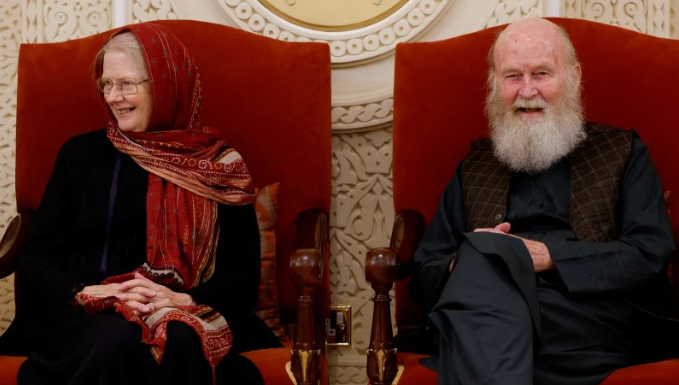Best Free Resources for Traders in 2025: From Charts to AI Alerts
December 01 , 2025

Qatar has successfully assisted in securing the release of an elderly British couple imprisoned in Afghanistan, demonstrating the nation’s growing diplomatic role in crisis mediation. The development highlights international cooperation and humanitarian diplomacy in conflict zones.
In a remarkable display of humanitarian diplomacy, Qatar has helped secure the release of an elderly British couple who were imprisoned in Afghanistan. This intervention underscores Qatar’s growing role in mediating international crises and highlights the complexities of navigating legal and political systems in conflict zones.
The elderly couple, both British citizens, were detained in Afghanistan under unclear circumstances that sparked international concern. While the specifics of their detention have not been fully disclosed, reports indicate that local authorities had initially charged them with allegations related to visa or residency violations.
The case attracted attention due to the couple’s age and vulnerability, prompting diplomatic efforts from the British government and allied nations to secure their release. Their detention also highlighted the challenges foreign nationals may face when navigating legal frameworks in countries experiencing political instability.
Qatar played a pivotal role in mediating the situation, leveraging its diplomatic relationships and reputation as a neutral intermediary. Qatari officials engaged with Afghan authorities, facilitated communication between the parties involved, and worked to ensure the couple’s safety and eventual release.
This intervention is part of Qatar’s broader diplomatic strategy, which has included mediating conflicts in the Middle East, negotiating humanitarian access, and assisting in the release of hostages or detained foreign nationals. Qatar’s involvement demonstrates its capacity to influence sensitive international situations positively.
The release has been met with widespread international approval. British government officials expressed gratitude toward Qatar for its efforts and highlighted the importance of diplomatic collaboration in securing the couple’s freedom. Human rights organizations also applauded the outcome, emphasizing the humanitarian aspects of the intervention.
Media coverage has highlighted Qatar’s role as a reliable mediator and the broader implications for international crisis diplomacy. Analysts suggest that successful interventions like this enhance Qatar’s credibility on the global stage and strengthen its influence in regional and international affairs.
Negotiating the release of the elderly British couple involved navigating several challenges, including:
Despite these hurdles, Qatar’s careful diplomacy facilitated a peaceful and successful resolution.
The release of the British couple highlights the importance of humanitarian diplomacy in conflict-affected regions. It underscores the need for neutral actors who can engage with multiple parties, navigate complex legal and political environments, and prioritize the safety and well-being of vulnerable individuals.
Qatar’s intervention also illustrates how diplomatic influence can extend beyond political negotiations to practical humanitarian outcomes, setting a precedent for future crisis mediation efforts involving foreign nationals in conflict zones.
The successful release may positively impact diplomatic relations between the United Kingdom and Afghanistan, as well as strengthen cooperation with Qatar. While the broader political situation in Afghanistan remains complex, the case demonstrates the potential for constructive engagement and crisis resolution through third-party mediation.
British officials have indicated that they will continue to work with international partners to protect their citizens abroad and to ensure that similar situations can be resolved swiftly and safely in the future.
Qatar has increasingly positioned itself as a key mediator in regional and international conflicts. Its efforts in the Middle East and South Asia have included negotiating ceasefires, facilitating humanitarian aid, and mediating hostage or detention situations. This case reinforces Qatar’s reputation as a neutral and effective actor capable of bridging divides between conflicting parties.
Analysts suggest that Qatar’s ability to maintain relationships with diverse political actors enables it to address complex diplomatic challenges, making it a valuable partner in international crisis management.
The successful resolution of the British couple’s imprisonment provides important lessons for international diplomacy:
The release of the elderly British couple from Afghan detention, facilitated by Qatar, is a powerful example of the role humanitarian diplomacy can play in resolving complex international crises. It demonstrates the importance of neutral mediators, effective international cooperation, and a focus on humanitarian outcomes in situations involving vulnerable individuals.
As global conflicts and political complexities continue to place citizens at risk, Qatar’s successful intervention underscores the need for proactive diplomacy, strategic mediation, and international collaboration. For Palestinian diplomats, international mediators, and global policymakers, the case highlights how careful negotiation and engagement can lead to life-saving outcomes and reinforce the importance of humanitarian principles in diplomacy.